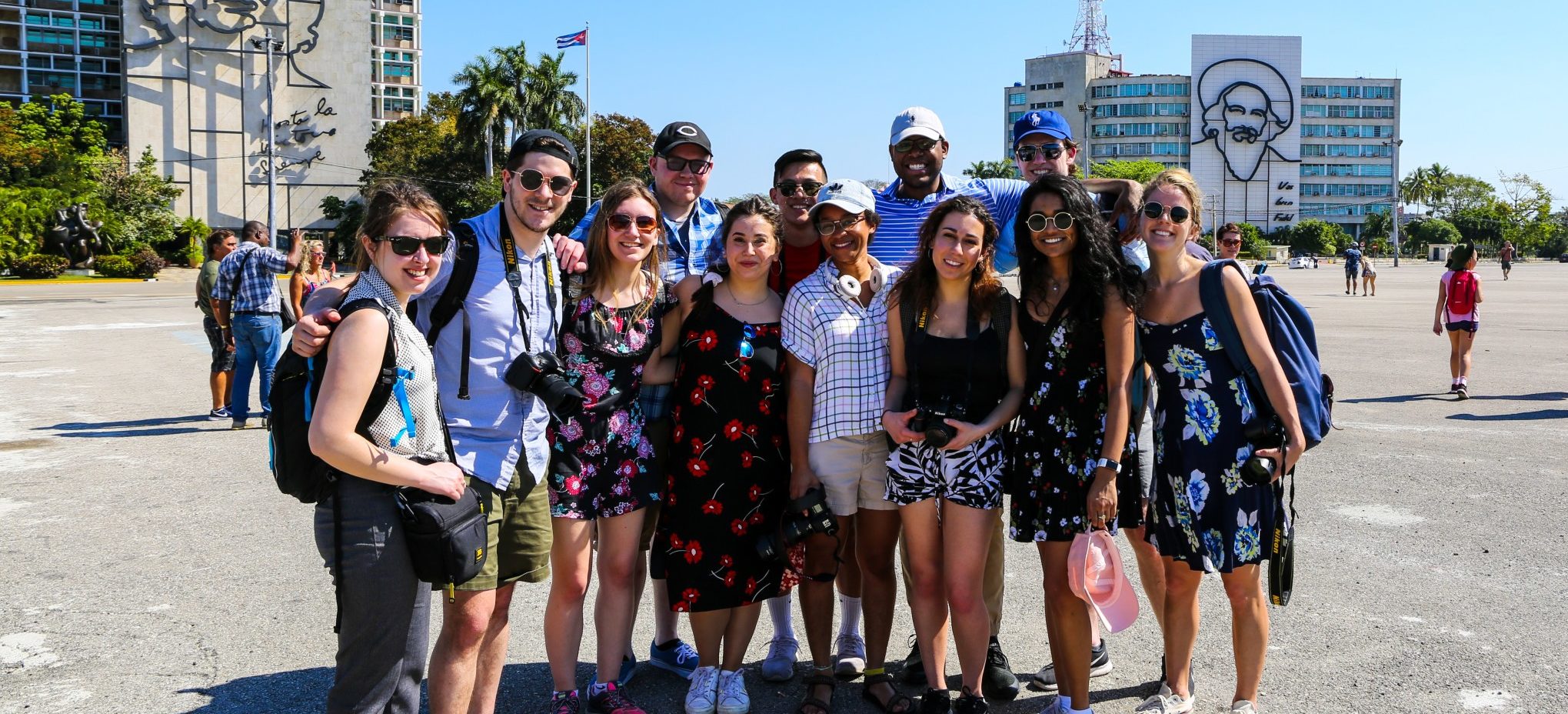Two video storytelling projects by School of Journalism students were recently recognized with Boston/New England Emmy Awards from the National Academy of Television Arts and Sciences. The awards showcase outstanding achievements in production by undergraduate college and high school students who are studying media and journalism – and Northeastern School of Journalism students are well-poised to shine. This year, both winning Northeastern projects were produced during the 2019 spring break trip to Cuba led by Carlene Hempel, Teaching Professor in the School of Journalism.
In the College/University Magazine Program category, Cuba: Behind the Blockade – featuring stories by Jonathan Mejia, Daniel Hentz, and Seamus McAvoy – earned top recognition.
Jonathan Mejia (undergraduate) – who was a recipient of support from The Joe Thomas Explore the World Fund, which helps to make it possible for Journalism students to have international experiences – explored a new 3G network and how it is evolving Cuban communication.
“This entire project was very meaningful to me,” he said. “The reason I wanted to pursue journalism was to meet people and tell their stories and their truths, so it was incredibly special to get to meet these residents in Cuba and hear what’s going on. When I heard they had gotten 3G internet, I knew this was going to be the story. The year before, when I was there for a different trip, they were using WiFi cards, so I knew this development was going to be a huge deal for them.”
Mejia added, “I love video as a format for the project, because it allowed us to put multiple stories together so viewers could get to know more about the culture and people…
It’s an amazing feeling to be recognized for all of the hard work…
“I went into the project just wanting to tell people’s stories, so when I got news we had won an award, it felt great. I am grateful to the National Academy of Television, the scholarship that allowed me to go abroad, and Professors Carlene Hempel and Mike Beaudet for supporting my growth.”
Daniel Hentz (graduate) focused on Cuban coral reefs and the country’s surprisingly sophisticated storm resiliency.
“This trip to Cuba was a chance to do what I came to Northeastern for: craft stories that require me to immerse myself into an environment in a way that is personal and meaningful. On this particular trip, we were able to go about reporting our stories in more ambitious ways than would have otherwise been allowed at other institutions,” said Hentz, who went diving on the country’s reefs while on assignment. “This international reporting experience was one of two that I completed (I just came back from Panama in March). Both experiences thrust us into an environment that was immediately demanding: we met deadlines, learned to work in a place where we didn’t all know the language, and we really got a taste for international reporting…
The experiences taught us how to be nimble in ways that today’s journalism requires.
“Cuba is an intensely misunderstood and often stereotyped country,” Hentz added. “Beneath the veneer of the vintage cars and distinct flavor of hispanic culture that many Americans see, there is a real resilience in the people. Despite a clearly fractious history between the United States and Cuba, the country’s residents seem to look past that when you come to visit. This is why good journalism matters; it’s an opportunity to be conduits of conversation and, hopefully, dissolve the stereotypes that keep good people from talking to one another.”
Seamus McAvoy (undergraduate), who was also a recipient of support from The Joe Thomas Explore the World Fund, examined the country’s age-old reliance on traditional medicines.
“Completing an embedded course like this, where we were on the ground reporting, has been the single most valuable learning experience in my journalism career so far – both academic and professional. We all had to think on our feet and improvise; nothing prepares you better for a journalism career than hands-on experience like that,” he said. “The project itself started as an opportunity to develop my video skills; I had never made a digital journalism video package before. But, it ended up being so much more than I imagined, and having it turn into something that is now being recognized in a formal fashion is a huge bonus and an honor.”
In the Arts & Entertainment/Cultural Affairs category, Hip Hop in Cuba – produced by Collyn Stephens – took top place. At the time of the trip to Cuba, Collyn was a graduate student in CAMD’s Media Advocacy program. Her project introduces viewers to some of the young hip hop performers who claim they are “architects” of Cuba’s newest musical genre. For the trip, Collyn was also a recipient of support from The Joe Thomas Explore the World Fund.
“I hope this project gives Americans some sense of connection with our neighbor.”
These two award-winning projects are both part of Detrás del Bloqueo (Behind the Embargo), a School of Journalism production that highlights all of the reporting from the 2019 spring break in Cuba. This work, as well as work from the 2018 trip, was showcased in last fall’s Gallery 360 exhibition entitled Cuba: Detrás del Bloqueo/Behind the Blockade.


